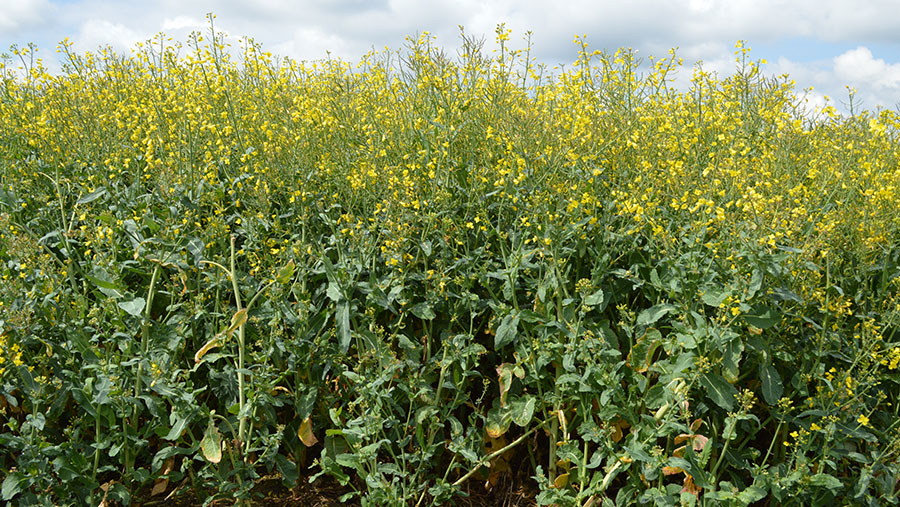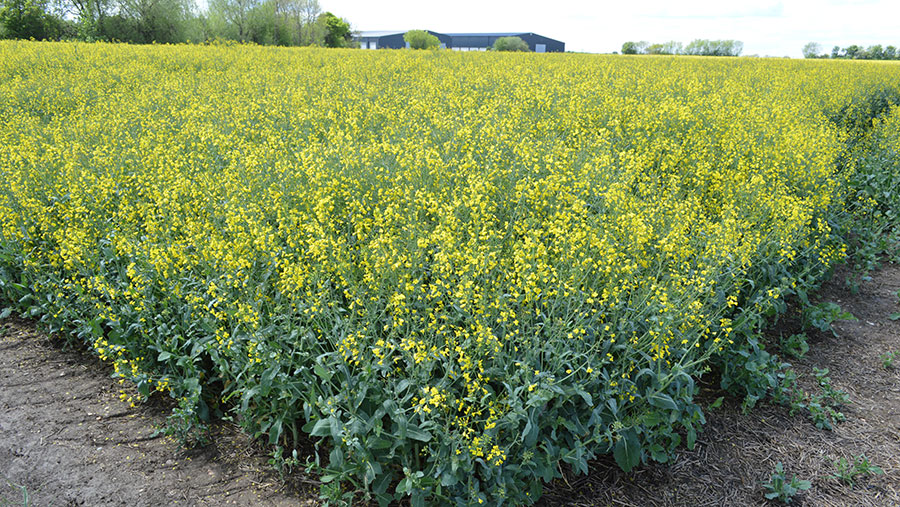Harvest 2021: Disease-tolerant OSR performance assessed
 OSR variety PT303 © MAG/David Jones
OSR variety PT303 © MAG/David Jones A sclerotinia-tolerant oilseed rape variety outyielded others on an Essex farm and was also grown at a lower cost, so its area will be expanded next season.
Alex Jessop-Gaymer grew a demonstration block of 4ha of the disease-tolerant variety PT303 on the family farm within a total oilseed rape area of 250ha.
The variety yielded 3.4t/ha, compared with fellow hybrid Aurelia at 3.1t/ha, within an average farm yield of 3t/ha, with all but 20ha of the rapeseed cut last week.
After an oilseed rape season of disappointing yields, Mr Jessop-Gaymer says the area of the variety will be increased to 70ha next season to give it a true test across a bigger area.
“The variety looks promising, as it gave a touch more yield at a lower growing cost,” he says.
See also: Essex grower sees cost savings with disease-tolerant OSR

OSR variety PT303 © MAG/David Jones
Flowering sprays
Most oilseed rape crops on the farm had two flowering fungicide sprays this season, but the disease-tolerant variety only had one, meaning a saving of about £15-£20/ha in spray costs and one fewer sprayer application.
The initial flowering spray across the whole of the farm’s 250ha of oilseed rape was the azole fungicide prothioconazole, while all the varieties, except PT303, received a further spray of the same azole.
PT303 outyielded the other varieties such as hybrids Aurelia and Exstar, and the conventional Flamingo, while for next season the farm’s oilseed rape area will stay at 250ha with an all-hybrid mix of varieties.
Sclerotinia stem rot is a serious disease risk for flowering oilseed rape and can halve yields in bad infection years. The disease favours warm and humid weather at flowering and short oilseed rape rotations.
Flea beetle pressure
Mr Jessop-Gaymer says this season has seen less cabbage stem flea beetle pressure in Essex, with the area of oilseed rape grown in the county lower. The farm’s crop got away well in the autumn, although it was drilled late and then suffered from a wet winter.
He farms with his father-in-law, John Gaymer, and his wife, Katie, in the family business, RP & J Gaymer at Dunsteads Farms, Ingatestone, near Chelmsford, covering about 1,800ha of arable land.
There is expected to be good demand for PT303 from breeding company Corteva Agriscience, with enough seed to drill 2.5% of the rapeseed crop area this summer, or 5% of the hybrid area – assuming a 50-50 split between hybrid and conventional varieties.
